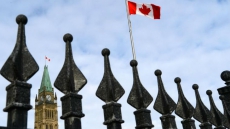Canada could see the end of the first wave of the COVID-19 epidemic before autumn, according to federal projections, but only if strong physical distancing measures are strictly maintained the whole time. Even in that best-case scenario, the federal public health agency projects that a total of 4,400 to 44,000 Canadians could die of COVID-19 in the coming months.
In the middle of that range, if 2.5 to 5 per cent of Canadians are infected in the course of the pandemic, the country would see 11,000 to 22,000 deaths. If the containment measures Canadians are living under now are relaxed or abandoned, the death toll could be much, much higher, the agency says.
"These stark numbers tell us that we must do everything that we can now to stay in that best-case scenario," said chief public health officer Dr. Theresa Tam, in releasing the national projections Thursday morning in Ottawa. Canada can't prevent every death, but it must prevent every death that it can, she said.
The agency released modelling data with different scenarios, warning that what happens depends very much on how Canadians behave to keep the respiratory illness from spreading. "Models are not a crystal ball and cannot predict what will happen," said Tam.
The Public Health Agency of Canada says short-term estimates are more reliable, and it anticipates 500 to 700 total deaths in Canada by the end of next week. The model for the best-case scenario suggests between 1 and 10 per cent of the population will be infected, and the epidemic will peak nationally sometime between late spring and early summer.
If the infection rate reaches 2.5 per cent of Canada's population, leading to an estimated 73,000 hospitalizations, the health system will begin to have difficulty coping, Tam said. Public health officials don't yet know if Canada is trending toward the best-case scenario, but Tam said the country stands a good chance of falling into that zone.
Health Minister Patty Hajdu acknowledged the news and uncertainty about Canada's future is distressing, though individual Canadians can help push the country toward a better outcome.
"That fear is real, but it will take the courage of all of us to maintain the practices that public health has prescribed us," Hajdu said. Even after we've reached the peak number of infections, aggressive physical distancing measures would need to stay in place until the wave recedes completely. "If we let up, new waves of transmission will take off in our high-risk susceptible population and the epidemic will re-ignite," Tam said.
The model is based on an aggregate of provincial figures and projections, and Tam said the pandemic will play out differently in different parts of the country. As for what comes next, Tam suggested that will also vary from region to region. Canada will eventually begin to carefully lift the strict measures that are in place now, but they may have to be reinstated as new outbreaks flare.
Those flare-ups could continue for months, until a vaccine is distributed or the majority of the population is immune, Tam said.
"All I can say is that it will be a very cautious approach," Tam said.
The border between Canada and the United States is likely to remain closed to non-essential travel for some time to make sure Canada stays on the right trajectory, Tam said. America's outbreak has been far more widespread, with 427,460 cases, according to the latest figures from the Centers for Disease Control and Prevention.
"We can't adjust any of (the border controls) until we’ve seen not just what happens within the Canadian context but definitely what’s happening on the other side of the border," Tam said.
Hajdu added that the pandemic is global, and won't end until all countries have taken the right measures to stop the spread and prevent future outbreaks. To that end, Canada will have to make tests for the virus far more available to detect and stamp out new chains of transmission as they appear, Tam said.
Canada has the benefit of being at an earlier stage of the epidemic compared to other countries, and can learn from their experiences when it comes to lifting extreme isolation measures, she said. Already, Canada's curve appears to be bending in the right direction, but Tam warned that could change at any time if any part of the country lets up.




